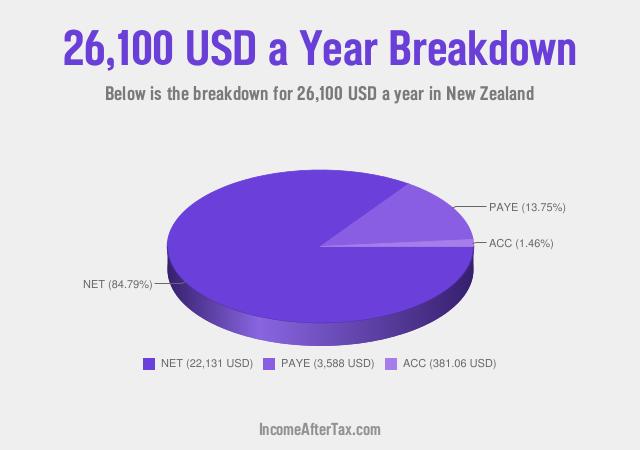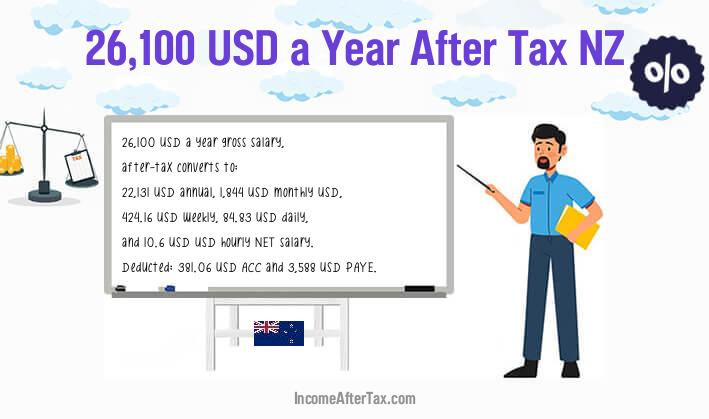How much is $26,100 a Year After Tax in New Zealand?

In the year 2026, in New Zealand, $26,100 a year gross salary, after-tax, is $22,131 annual, $1,844 monthly, $424.16 weekly, $84.83 daily, and $10.6 hourly gross based on the information provided in the calculator above.
Check the table below for a breakdown of $26,100 a year after tax in New Zealand.
| Yearly | Monthly | Weekly | Daily | Hourly | |
|---|---|---|---|---|---|
| Gross Salary | $26,100 | $2,175 | $500.22 | $100.04 | $12.51 |
| PAYE | $3,588 | $298.96 | $68.76 | $13.75 | $1.72 |
| ACC | $381.06 | $31.76 | $7.3 | $1.46 | $0.18 |
| Personal Allowance | $2,340 Per Year | ||||
| Taxable Salary | $23,760 Per Year | ||||
| Take-Home Pay (NET) | $22,131 | $1,844 | $424.16 | $84.83 | $10.6 |
If you're interested in discovering how much you would earn a year with an extra $100 added to your annual salary, you can explore the calculations for a $26,200 annual income. This will provide you with a better understanding of the difference that additional $100 can make to your annual earnings.
$26,100 a Year is How Much a Month?
When evaluating a $26,100 a year after tax income, the corresponding monthly earnings can be determined:
- Take-home (NET) monthly income: $1,844
In order to discover $26,100 a year is how much a month? - simply divide the annual amount by 12, resulting in a monthly income of $1,844.
$26,100 a Year is How Much a Week?
When assessing a $26,100 a year after tax salary, the associated weekly earnings can be calculated:
- Take-home (NET) weekly income: $424.16
To answer $26,100 a year is how much a week? - divide the annual sum by 52, resulting in a weekly income of $424.16.
$26,100 a Year is How Much a Day?
When examining a $26,100 a year after tax income, the corresponding daily earnings can be determined:
- Take-home (NET) daily income: $84.83 (assuming a 5-day work week)
To find out $26,100 a year is how much a day? - divide the annual figure by 260 (52 weeks * 5 days), resulting in a daily income of $84.83.
$26,100 a Year is How Much an Hour?
When analyzing a $26,100 a year after-tax salary, the associated hourly earnings can be calculated:
- Take-home (NET) hourly income: $10.6 (assuming a 40-hour work week)
To answer $26,100 a year is how much an hour? - divide the annual amount by 2,080 (52 weeks * 40 hours), resulting in an hourly income of $10.6.
Is $26,100 a Year a Good Salary?
To answer if $26,100 a year is a good salary. We need to compare it to the national median. After calculation using ongoing year (2026) data, the salary of $26,100 a year is 2.15 times or 53.53% lower than the national median. So, is $26,100 a year a good salary?
Based on comparison to the national median and that it is more than half below average, in our opinion, it could only be considered an OK salary for a person without financial responsibilities, but for someone who has to pay rent, mortgage, and other expenses this is a very low salary to get in New Zealand and could result in financial struggle.
We think these three links are helpful and related to the $26,100 After Tax NZ: Tax rates for individuals, Money & Taxes in New Zealand, and Taxation in New Zealand.

